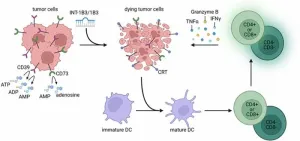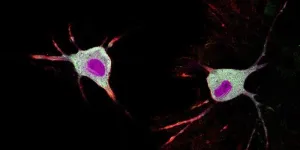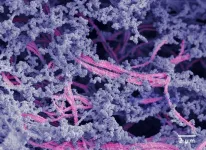(Press-News.org) UCLA Health researchers, in collaboration with researchers from the Republic of Ireland and Northern Ireland, have received $9.5 million award from the National Institutes of Health (NIH) with support from European funding agencies — The Science Foundation Ireland (SFI) and the Public Health Agency Health & Social Care (HSC) — to study the effects of polyphenols on cognitive health and the brain-gut microbiome system.
The proposal, named MAEVE, stands for “Microbiota mediated flavonoid metabolites for cognitive health.”
In this interdisciplinary and multicenter study funded through the Tripartite US-Ireland Research & Development Partnership Program, researchers will investigate the impact of dietary polyphenol supplements on 300 older adults at-risk for Alzheimer’s disease. Polyphenols — a key component of Mediterranean diets and found in berries, grapes, green tea, and cocoa — may delay cognitive decline by preserving brain function and structure through gut microbiome metabolites by altering the physiology of the host’s secondary bile acids, highlighting their potential role in Alzheimer's disease prevention.
“It’s a multicenter, longitudinal, and translational intervention study designed so that we can look at the mechanisms and pathways involved in cognitive decline,” said Aparna Church, PhD, co-director of the UCLA Goodman-Luskin Microbiome Center and principal investigator. “We’re looking at multiple markers such as cognitive functioning, brain structure and function, the microbiome and microbial polyphenol metabolites, inflammatory markers like interleukins, and Alzheimer’s disease-specific plasma markers such as tau proteins ptau181 and ptau217.”
In this five-year study, Church and her co-investigators will explore the relationship between polyphenols, cognitive function, and brain health through four project aims in 50+ year old adults with enhanced risk for Alzheimer’s disease. First, the researchers will assess the protective effects of dietary polyphenol supplementation on brain (using multimodal MRI) and cognitive parameters. Then, they will analyze microbiome metabolites, inflammatory markers, and Alzheimer’s disease biomarkers related to polyphenol intake. Afterwards, they will use bioinformatics and machine learning approaches to explore the associations between polyphenol intake and gut microbial metabolites, inflammatory and Alzheimer’s disease markers, brain parameters, and cognitive function. Finally, researchers will use a reverse translational approach whereby stool transplants from high-risk individuals on the polyphenol diet supplementation into mouse models will be conducted to better understand the underlying mechanisms.
“We’re hoping to better understand the role of dietary polyphenols in slowing the development of cognitive decline and how this is all influenced by the brain and gut microbiome,” Church said. “This will help us better understand the ameliorative properties of a polyphenol-rich diet and whether [we need] diet interventions and regimes to delay the onset and progression of cognitive decline.”
UCLA Health researchers, in collaboration with researchers from the Republic of Ireland and Northern Ireland, have received $9.5 million award from the National Institutes of Health (NIH) with support from European funding agencies — The Science Foundation Ireland (SFI) and the Public Health Agency Health & Social Care (HSC) — to study the effects of polyphenols on cognitive health and the brain-gut microbiome system.
The proposal, named MAEVE, stands for “Microbiota mediated flavonoid metabolites for cognitive health.”
In this interdisciplinary and multicenter study funded through the Tripartite US-Ireland Research & Development Partnership Program, researchers will investigate the impact of dietary polyphenol supplements on 300 older adults at-risk for Alzheimer’s disease. Polyphenols — a key component of Mediterranean diets and found in berries, grapes, green tea, and cocoa — may delay cognitive decline by preserving brain function and structure through gut microbiome metabolites by altering the physiology of the host’s secondary bile acids, highlighting their potential role in Alzheimer's disease prevention.
“It’s a multicenter, longitudinal, and translational intervention study designed so that we can look at the mechanisms and pathways involved in cognitive decline,” said Aparna Church, PhD, co-director of the UCLA Goodman-Luskin Microbiome Center and principal investigator. “We’re looking at multiple markers such as cognitive functioning, brain structure and function, the microbiome and microbial polyphenol metabolites, inflammatory markers like interleukins, and Alzheimer’s disease-specific plasma markers such as tau proteins ptau181 and ptau217.”
In this five-year study, Church and her co-investigators will explore the relationship between polyphenols, cognitive function, and brain health through four project aims in 50+ year old adults with enhanced risk for Alzheimer’s disease. First, the researchers will assess the protective effects of dietary polyphenol supplementation on brain (using multimodal MRI) and cognitive parameters. Then, they will analyze microbiome metabolites, inflammatory markers, and Alzheimer’s disease biomarkers related to polyphenol intake. Afterwards, they will use bioinformatics and machine learning approaches to explore the associations between polyphenol intake and gut microbial metabolites, inflammatory and Alzheimer’s disease markers, brain parameters, and cognitive function. Finally, researchers will use a reverse translational approach whereby stool transplants from high-risk individuals on the polyphenol diet supplementation into mouse models will be conducted to better understand the underlying mechanisms.
“We’re hoping to better understand the role of dietary polyphenols in slowing the development of cognitive decline and how this is all influenced by the brain and gut microbiome,” Church said. “This will help us better understand the ameliorative properties of a polyphenol-rich diet and whether [we need] diet interventions and regimes to delay the onset and progression of cognitive decline.”
END
Researchers receive 9.5 million grant to study relationship between polyphenol intake, Alzheimer’s prevention, and the brain-gut-microbiome system
2024-08-05
ELSE PRESS RELEASES FROM THIS DATE:
UH astronomers uncover risks to planets that could host life
2024-08-05
A groundbreaking study has revealed that red dwarf stars can produce stellar flares that carry far-ultraviolet (far-UV) radiation levels much higher than previously believed. This discovery suggests that the intense UV radiation from these flares could significantly impact whether planets around red dwarf stars can be habitable. Led by current and former astronomers from the University of Hawaiʻi Institute for Astronomy (IfA), the research was recently published in the Monthly Notices of the Royal Astronomical Society.
“Few stars have been thought to generate ...
An overlooked side-effect of the housing crisis may be putting Californians at increased risk from climate disasters
2024-08-05
In a new article for the journal Proceedings of the National Academy of Sciences, UC Santa Cruz researchers laid out the foundation for their highly-anticipated upcoming study of how lack of affordable housing in urban areas of California may be driving increased development in and near wildlands, leading to more severe climate change impacts.
Since the 1990s, California has led the nation in the growth of Wildland-Urban Interface (WUI) development, with more than one in three households in the state now located immediately next to or within ...
INT-1B3 miR-193a-3p mimic boosts t cell immunity and induces tumor cell death
2024-08-05
BUFFALO, NY- August 5, 2024 – A new research paper was published in Oncotarget's Volume 15 on July 12, 2024, entitled, “INT-1B3, an LNP formulated miR-193a-3p mimic, promotes anti-tumor immunity by enhancing T cell mediated immune responses via modulation of the tumor microenvironment and induction of immunogenic cell death.”
In this study, researchers Chantal L. Duurland, Thijs de Gunst, Harm C. den Boer, Marion T.J. van den Bosch, Bryony J. Telford, Rogier M. Vos, Xiaolei Xie, Mingfa Zang, Fang Wang, Yingying Shao, Xiaoyu ...
Wayne State University professor receives NSF grant to study quantum tunneling
2024-08-05
DETROIT — A Wayne State University professor recently received a three-year, $626,467 grant from the National Science Foundation’s Division of Physics. The project, “Probing Nonadiabatic Strong Field Ionization with Phase-Resolved Attoclock,” will research a quantum mechanical process known as quantum tunneling.
Wen Li, Ph.D., professor of chemistry in Wayne State’s College of Liberal Arts and Sciences and his research team propose a new technique they have developed to study the process of quantum tunneling, a quantum mechanical phenomenon in which an object such as an electron or atom passes through ...
Adding metastasis-directed radiation therapy boosts progression-free survival in metastatic pancreatic cancer
2024-08-05
Researchers from The University of Texas MD Anderson Cancer Center demonstrated that adding metastasis-directed radiation therapy to standard-of-care chemotherapy improved progression-free survival (PFS) in patients with oligometastatic pancreatic cancer. Findings from the multicenter EXTEND trial, published today in the Journal of Clinical Oncology, were first presented at the 2024 American Society of Clinical Oncology (ASCO) Gastrointestinal Cancers Symposium.
At a median follow-up of 17.3 months, PFS was 10.3 months in patients who received metastasis-directed therapy (MDT) ...
New method tracks how psychedelics affect neurons in minutes
2024-08-05
Researchers at the University of California, Davis have developed a rapid, noninvasive tool to track the neurons and biomolecules activated in the brain by psychedelic drugs. The protein-based tool, which is called Ca2+-activated Split-TurboID, or CaST, is described in research published in Nature Methods.
There has been mounting interest in the value of psychedelic-inspired compounds as treatments for brain disorders including depression, post-traumatic stress disorder and substance use disorder. Psychedelic ...
Record number of drug overdoses in one year reported
2024-08-05
August 4, 2024-- Drug-involved overdose deaths increased by over 500 percent in 2022 according to a study at Columbia University Mailman School of Public Health, with trends attributed to synthetic opioids. National data shows that fentanyl and heroin in particular attributed substantially to the rise particularly since 2014. However, the study also reports that income protection policies, can have a supportive role in preventing fatal drug overdoses. The findings are reported in the International ...
Could this new drug turn back the clock on multiple sclerosis?
2024-08-05
Could This New Drug Turn Back the Clock on Multiple Sclerosis?
Ten years of work, and a little help from the green mamba snake, has resulted in a promising new drug that is already being tested in clinical trials.
Multiple sclerosis (MS) degrades the protective insulation around nerve cells, leaving their axons, which carry electrical impulses, exposed like bare wires. This can cause devastating problems with movement, balance and vision; and without treatment, it can lead to paralysis, loss of independence and a shortened lifespan.
Now, scientists at UC San Francisco and Contineum Therapeutics have developed a drug that spurs the body to replace the lost insulation, ...
Greenland fossil discovery reveals increased risk of sea-level catastrophe
2024-08-05
The story of Greenland keeps getting greener—and scarier.
A new study provides the first direct evidence that the center—not just the edges—of Greenland’s ice sheet melted away in the recent geological past and the now-ice-covered island was then home to a green, tundra landscape.
A team of scientists re-examined a few inches of sediment from the bottom of a two-mile-deep ice core extracted at the very center of Greenland in 1993—and held for 30 years in a Colorado storage facility. They were amazed to discover ...
New biomaterial regrows damaged cartilage in joints
2024-08-05
Northwestern University scientists have developed a new bioactive material that successfully regenerated high-quality cartilage in the knee joints of a large-animal model.
Although it looks like a rubbery goo, the material is actually a complex network of molecular components, which work together to mimic cartilage’s natural environment in the body.
In the new study, the researchers applied the material to damaged cartilage in the animals’ knee joints. Within just six months, the researchers observed evidence of enhanced repair, including ...




